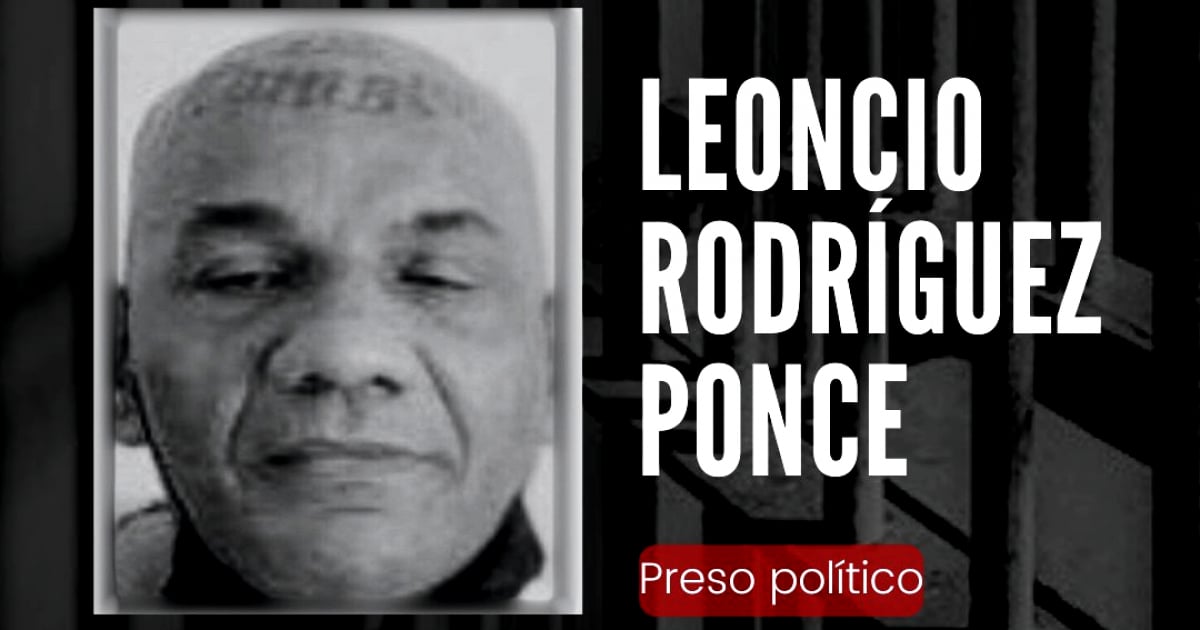The dire condition of Leoncio Rodríguez Ponce, a Cuban political prisoner who has been incarcerated for 36 years, has sparked alarm among human rights organizations such as Cubalex. These groups highlight the lack of medical care and the severe deterioration of his health. Held in Holguín's provincial prison, Rodríguez Ponce battles numerous life-threatening illnesses, while prison authorities persistently deny him basic medical attention.
An Emblem of Defiance Amidst Neglect
Originally from Guantánamo, the 60-year-old Rodríguez Ponce endures a range of health issues, including ulcers, hypertension, severe malnutrition, kidney problems, rheumatism, and hemorrhoids. Despite authorization from the Directorate of Prisons for his transfer to Guantánamo, the local authorities have refused to accept him. This decision keeps him isolated from his family and without access to essential support networks.
Since his imprisonment on June 28, 1988, Rodríguez Ponce has faced constant retribution due to his opposition to the Cuban regime. He has been accused of offenses like "disrespect," "prison disorder," and an alleged "attack on Fidel Castro" after an incident at Boniato prison, where he spat in a cell formerly occupied by the dictator.
Punitive Transfers as a Form of Control
Throughout his prolonged detention, Rodríguez Ponce has been moved between various prisons across the country, including Boniato in Santiago de Cuba, Kilo 8 in Camagüey, Villa Clara, Combinado del Este in Havana, Pinar del Río, and Guantánamo. For the past three years, he has been confined in Holguín after another rejection in Guantánamo. These frequent relocations have not only exacerbated his isolation but also hindered his access to adequate medical treatment and familial connections.
One of the most notable incidents during his imprisonment occurred at Boniato, where, after suffering a beating, he tattooed the word "change" on his forehead in protest. The State Security has repeatedly pressured him to remove the tattoo, offering conditional release in exchange. Rodríguez Ponce has refused these offers, resulting in the denial of prison benefits.
A National Issue of Human Rights Violations
The plight of Rodríguez Ponce is not an isolated case. The situation of political prisoners in Cuba is alarming, with numerous reports of medical neglect and cruel treatment. For instance, activist Pedro Albert Sánchez has undertaken hunger strikes in prison, worsening his fragile health, and José Daniel Ferrer, leader of the Patriotic Union of Cuba (UNPACU), recently suffered a beating in prison, leaving him with visible facial injuries. These cases illustrate the systematic oppression and neglect faced by political prisoners on the island.
Cubalex and other international organizations have demanded that the Cuban regime provide adequate medical care, respect the fundamental rights of political prisoners, and take urgent measures to protect their physical and emotional well-being. These demands are increasingly vital in a context where health deterioration is used as a political pressure tool, exposing the extreme vulnerability of those who challenge the system.
A Call for Immediate Action
The case of Leoncio Rodríguez Ponce requires urgent attention. His resilience under inhumane conditions has made him a symbol of struggle, but it also highlights the brutality of a prison system that uses punishment and neglect as control mechanisms. Organizations like Cubalex urge the international community to amplify the visibility of this case and others like it, advocating for an immediate response to ensure the rights and lives of Cuban political prisoners are protected.
Rodríguez Ponce's situation is one of many that reveal the human rights violations in Cuba, where opposition to the regime is met with harsh punishment, and prison conditions pose a constant threat to detainees' lives. Sharing these stories and demanding justice is a necessary step to halt these practices and ensure respect for human dignity.
The Message to the European Union
From the high-security prison Kilo Ocho in Camagüey, Rodríguez Ponce sent a powerful open letter in January 2019 to Federica Mogherini, then the European Union's High Representative for Foreign Affairs, and Hugo Sobral, then Director General for the Americas at the European External Action Service. In his letter, the seasoned political prisoner posed nine questions challenging the coherence of European policy in light of the human rights abuses in Cuba.
Rodríguez Ponce recorded a message from prison, which was disseminated by Jorge Luis García Pérez Antúnez, leader of the Civic Resistance Front "Orlando Zapata Tamayo." In his address, he questioned why the European Union maintained a lenient stance toward the Cuban regime while exerting pressure on dictatorships like Venezuela. He also inquired whether the human rights of the Cuban people were deemed less important than European economic and commercial interests.
The prisoner further criticized the lack of genuine pressure to release political prisoners and pointed out the hypocrisy of condemning the U.S. embargo without holding the Cuban regime accountable for blocking the fundamental rights of its people. "Do you not see that you are also complicit in this macabre and bloody game?" he concluded.
